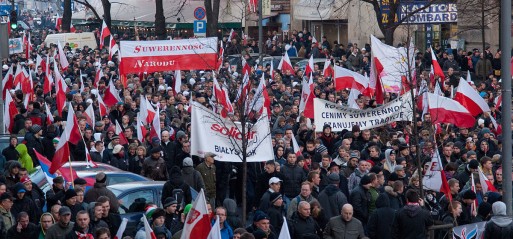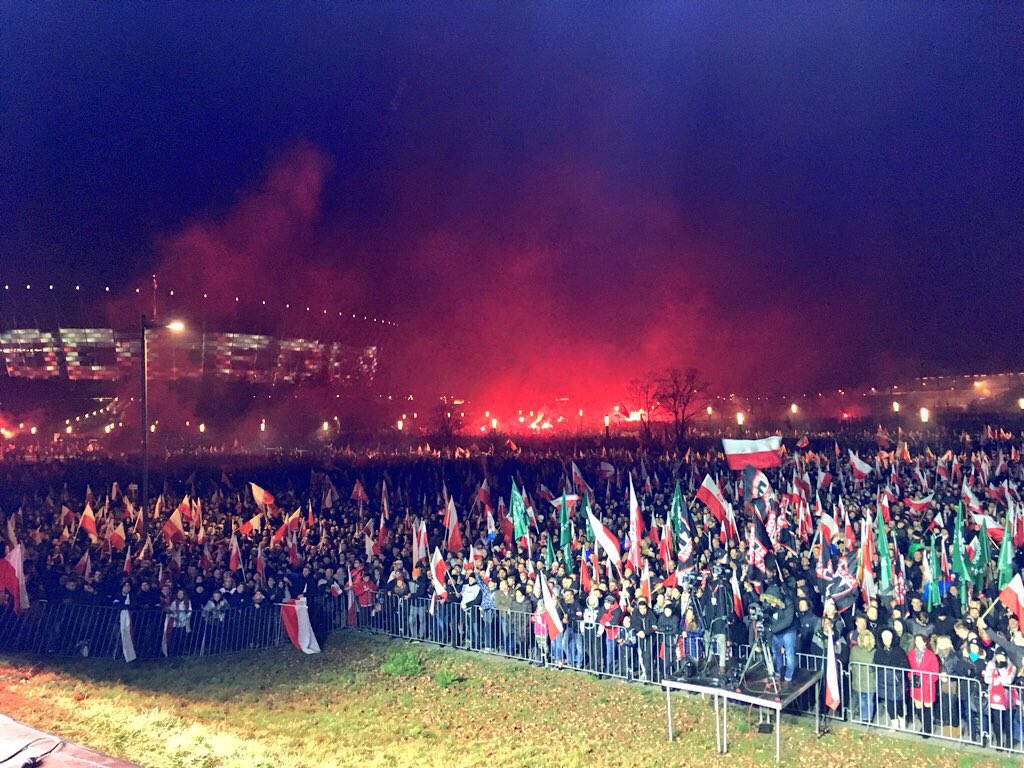angelburst29
The Living Force
October 26, 2018 - Polish ruling party wants deal on more US Troops before 2019 Election
Polish ruling party wants deal on more U.S. troops before 2019 election | Reuters
WARSAW (Reuters) - Poland’s ruling party wants to see concrete plans for increasing the presence of American troops on Polish soil before national elections are held next autumn, said Pawel Soloch, head of the National Security Bureau.
The nationalist Law and Justice (PiS) party says increasing the number of U.S. troops in the country is essential to ward off the threat it says is posed by Russia.
Securing an American base would help PiS show it is taking action to protect Poland from perceived Russian threats ahead of national elections, analysts say. PiS may then use this as an argument to win over more voters, after its narrower than expected victory in regional elections last Sunday.
“It’s clear the electoral calendar is at play. It is definitely important for us to finalize a larger American presence in the country,” Soloch told Reuters in an interview when asked about the government’s defense priorities ahead of the vote.
It remains unclear, however, whether plans for a proposed permanent American base in Poland dubbed “Fort Trump” by Warsaw will take the exact form pitched by President Andrzej Duda in his meeting with U.S. President Donald Trump in September.
Defense Minister Mariusz Blaszczak will travel to the United States on Monday and is expected to raise the issue with Trump’s National Security Advisor John Bolton once more.
Poland’s armed forces have suffered from decades of under-investment and some two-thirds of their equipment dates from the Soviet era.
The country has repeatedly called for a permanent U.S. military presence on its soil. The United States currently rotates troops through Poland temporarily, and permanently stationing forces there would be expensive.
As part of its mission, PiS - which has clashed on many issues with the European Union of which Poland is a member - has prioritized strong bilateral ties with the U.S. government under Trump, outside the scope of NATO.
Foreign Minister Jacek Czaputowicz, Deputy Minister of National Defence Tomasz Szatkowski and Soloch visited Brussels this week to inform NATO of their plans to expand the presence of American troops in the country.
NATO Secretary-General Jens Stoltenberg pressed the Polish delegation to provide concrete details about the proposals and to communicate their plans to all their allies, a NATO diplomat said.
In a meeting with Trump in September Duda said Poland was ready to invest $2 billion to facilitate the development of a permanent base.
But Soloch said only preliminary discussions have been held between the Ministry of Defence and the Pentagon.
No clear vision for the program is likely to materialize before March, Soloch added. A report drafted by the U.S. Congress and the Pentagon on strengthening the U.S.’s military presence in Eastern Europe is set for discussion next spring.
Only then will Poland be able to confirm the plans and make any related budget allocations.
Duda this year said he wants government plans to increase defense spending to 2.5 percent of GDP by 2030 to be sped up to 2024 if economic developments allow. NATO wants member countries to spend at least 2 percent of their GDP on defense.
Polish ruling party wants deal on more U.S. troops before 2019 election | Reuters
WARSAW (Reuters) - Poland’s ruling party wants to see concrete plans for increasing the presence of American troops on Polish soil before national elections are held next autumn, said Pawel Soloch, head of the National Security Bureau.
The nationalist Law and Justice (PiS) party says increasing the number of U.S. troops in the country is essential to ward off the threat it says is posed by Russia.
Securing an American base would help PiS show it is taking action to protect Poland from perceived Russian threats ahead of national elections, analysts say. PiS may then use this as an argument to win over more voters, after its narrower than expected victory in regional elections last Sunday.
“It’s clear the electoral calendar is at play. It is definitely important for us to finalize a larger American presence in the country,” Soloch told Reuters in an interview when asked about the government’s defense priorities ahead of the vote.
It remains unclear, however, whether plans for a proposed permanent American base in Poland dubbed “Fort Trump” by Warsaw will take the exact form pitched by President Andrzej Duda in his meeting with U.S. President Donald Trump in September.
Defense Minister Mariusz Blaszczak will travel to the United States on Monday and is expected to raise the issue with Trump’s National Security Advisor John Bolton once more.
Poland’s armed forces have suffered from decades of under-investment and some two-thirds of their equipment dates from the Soviet era.
The country has repeatedly called for a permanent U.S. military presence on its soil. The United States currently rotates troops through Poland temporarily, and permanently stationing forces there would be expensive.
As part of its mission, PiS - which has clashed on many issues with the European Union of which Poland is a member - has prioritized strong bilateral ties with the U.S. government under Trump, outside the scope of NATO.
Foreign Minister Jacek Czaputowicz, Deputy Minister of National Defence Tomasz Szatkowski and Soloch visited Brussels this week to inform NATO of their plans to expand the presence of American troops in the country.
NATO Secretary-General Jens Stoltenberg pressed the Polish delegation to provide concrete details about the proposals and to communicate their plans to all their allies, a NATO diplomat said.
In a meeting with Trump in September Duda said Poland was ready to invest $2 billion to facilitate the development of a permanent base.
But Soloch said only preliminary discussions have been held between the Ministry of Defence and the Pentagon.
No clear vision for the program is likely to materialize before March, Soloch added. A report drafted by the U.S. Congress and the Pentagon on strengthening the U.S.’s military presence in Eastern Europe is set for discussion next spring.
Only then will Poland be able to confirm the plans and make any related budget allocations.
Duda this year said he wants government plans to increase defense spending to 2.5 percent of GDP by 2030 to be sped up to 2024 if economic developments allow. NATO wants member countries to spend at least 2 percent of their GDP on defense.







